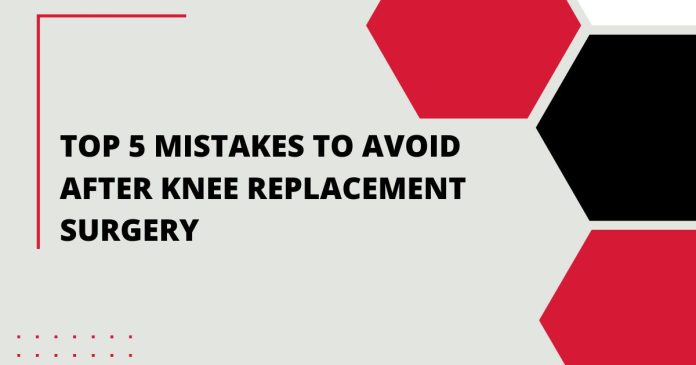Introduction
Knee replacement surgery, also known as knee arthroplasty, is a medical procedure that can significantly improve the quality of life for individuals suffering from chronic knee pain and mobility issues. While the surgery itself can provide relief and enhanced functionality, it’s crucial to understand that the post-surgery period requires careful attention and adherence to certain guidelines. In this article, we will explore the top 5 mistakes after knee replacement that individuals should avoid after undergoing knee replacement surgery to ensure a successful recovery and long-term benefits.
1. Neglecting Physical Therapy Sessions
One of the most critical aspects of recovery after knee replacement surgery is consistent physical therapy. Physical therapy helps in regaining strength, flexibility, and range of motion in the knee joint. Neglecting or skipping these sessions can lead to muscle stiffness, reduced joint mobility, and a longer recovery period. Follow the prescribed physical therapy plan to maximize the benefits of the surgery.
2. Ignoring Pain Management Strategies
Pain is a natural part of the recovery process, but ignoring proper pain management can hinder progress. Some individuals may try to tough it out, but unmanaged pain can limit your ability to move, perform exercises, and even sleep. Consult your healthcare provider for effective pain management techniques, which may include medication, ice therapy, or relaxation techniques.
3. Overexerting and Not Resting Enough
Finding the right balance between activity and rest is crucial after knee replacement surgery. Overexertion can strain the healing joint and surrounding tissues, leading to setbacks. On the other hand, not engaging in recommended exercises and movements can result in joint stiffness. Follow your surgeon’s guidelines and gradually increase activity levels while allowing ample time for rest.
4. Neglecting Wound Care and Hygiene
Proper wound care is essential to prevent infections and complications. Neglecting wound care can lead to infections that jeopardize the success of the surgery. Keep the surgical incision site clean, dry, and free from any irritants. Follow your healthcare provider’s instructions on cleaning and dressing the wound to ensure optimal healing.
5. Disregarding Dietary and Lifestyle Changes
Maintaining a healthy diet and lifestyle can significantly impact your recovery after knee replacement surgery. Proper nutrition supports tissue healing and overall well-being, while excess weight can strain the new joint. Consult a nutritionist for guidance on a balanced diet that promotes healing and weight management. Additionally, avoid smoking and limit alcohol intake, as these habits can hinder the healing process.
Conclusion
In conclusion, a successful recovery after knee replacement surgery requires dedication and attention to detail. By avoiding these top 5 mistakes – neglecting physical therapy, ignoring pain management, overexerting, neglecting wound care, and disregarding dietary and lifestyle changes – you can ensure a smoother rehabilitation process and enjoy the long-term benefits of the surgery. Remember, always follow your healthcare provider’s instructions and be patient with yourself throughout the recovery journey.
FAQs
1. How long does the recovery period after knee replacement surgery usually last? The recovery period can vary, but most individuals can expect to see significant improvements within 6 to 12 weeks post-surgery.
2. Can I resume my favorite sports activities after knee replacement? It’s essential to consult your surgeon before resuming any sports activities to ensure that your knee has fully healed and can handle the demands of the activity.
3. Is it normal to experience occasional discomfort even after successful recovery? Yes, some individuals may experience occasional discomfort, especially during changes in weather or increased activity. However, persistent or severe pain should be discussed with your healthcare provider.
4. Are there any long-term precautions I should take after knee replacement surgery? While you can resume most normal activities, high-impact sports and activities that strain the knee joint should be approached with caution to avoid potential complications.
5. How can I make my home environment safer during the recovery period? You can ensure a safe recovery environment by removing trip hazards, installing handrails, using assistive devices like a walker or cane, and arranging items within easy reach.

